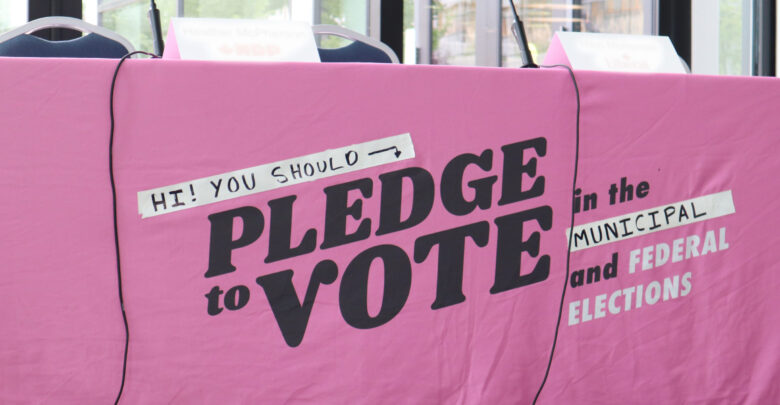 Mitchell Pawluk
Mitchell PawlukThe announcement of a federal election on April 28 by Prime Minister Mark Carney introduces significant challenges for Canadian university students. April is traditionally a period filled with final examinations, end of term projects, and preparation for summer employment or relocation. These overlapping responsibilities may impact students’ ability to engage fully in the electoral process. This raises concerns about voter turnout among young Canadians.
Historically, youth voter turnout in Canada has been lower compared to older demographics. Before the 1990s, overall voter participation was typically above 70 per cent. But it declined in subsequent years, reaching a low of 59 per cent in 2008. This downward trend was particularly evident among young voters, especially after the COVID-19 pandemic. Young Canadians often cite factors such as political disengagement, lack of information, and perceived inefficacy in the voting process as reasons for not participating.
However, organizations like Elections Canada and student advocacy groups have sought to address these issues by increasing awareness and accessibility for young voters. In 2021, over 800,000 students participated in Student Vote Canada, an initiative that provides educational resources on the voting process. After participating in the program, 75 per cent of participants reported increased preparedness to vote in the future. Programs like these indicate that the right resources and support can improve student engagement in elections.
The timing of this federal election poses a unique challenge because it coincides with a critical juncture in the academic calendar. At universities like the University of Alberta, students are typically immersed in final exams and major assignments during this period. The stress of studying for exams and meeting deadlines leaves little room for political engagement. Especially for students who may already feel disconnected from the electoral process.
Additionally, many students are preparing to move residences or secure summer employment, which further divides their attention and limits their ability to focus on the election. For those who attend university in a different city than their permanent residence, the logistics of voting can become even more complicated, especially if they need to update their voter registration or vote by mail. Additional barriers may deter students from prioritizing voting among their other commitments.
The U of A Students’ Union (UASU) has historically recognized the importance of student participation in elections. As such, it has implemented several initiatives to facilitate voting among students. The UASU has historically been involved in “Get Out The Vote” campaigns, a non-partisan effort aimed at increasing student voter turnout. These campaigns include events, information sessions, and digital outreach to ensure students are aware of their voting rights and options. Through these efforts, students are provided with resources to help them navigate the voting process, including information on where and how to vote.
Students who want to balance their academic responsibilities while participating in the election can take advantage of several strategies. One of the most effective options is advance voting, which allows individuals to cast their ballots before Election Day. Elections Canada also offers mail-in ballots, which can be particularly useful for students who may be moving or who live far from their registered polling station. Another potential solution is the establishment of on-campus polling stations, which can significantly reduce barriers to voting. The UASU has already announced dates when advanced polling on-campus will be available.
Managing time effectively is another crucial strategy for ensuring students can participate in the election. With final exams and moving plans taking up much of their schedules, planning ahead will be key for students. Setting aside time to review party platforms and make informed voting decisions can help. Student government initiatives and academic support services can also help alleviate stress and provide guidance on balancing responsibilities. The UASU, for example, updates students with election-related information. It’s an accessible and valuable resource for those seeking assistance with the voting process.
Despite the election’s timing, students can still have a say in the country’s future. The efforts of student organizations and advocacy groups play a crucial role in supporting student voter participation. It emphasizes that young Canadians have a vital role in shaping the nation’s political landscape. With the right strategies and resources, students can overcome these obstacles and make their voices heard in the upcoming federal election.




